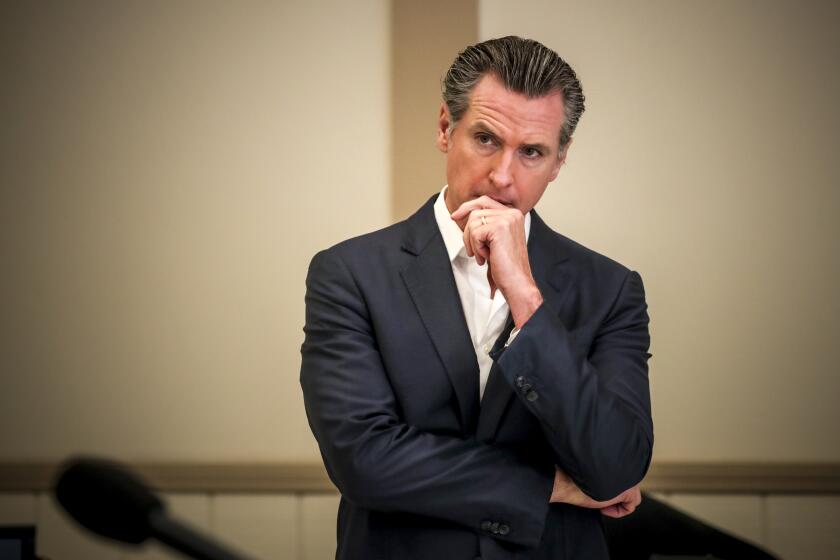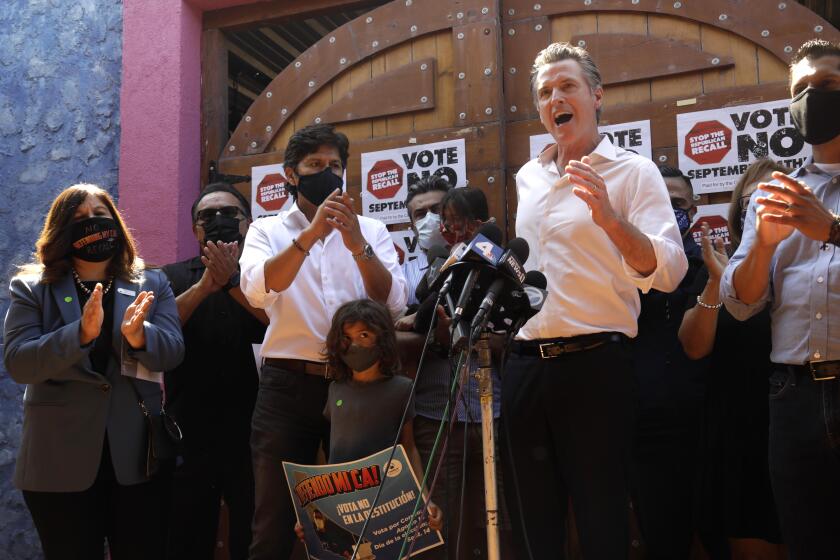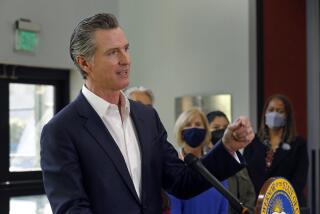Latinos were hardest hit by COVID-19. Now, Newsom needs them to thwart recall
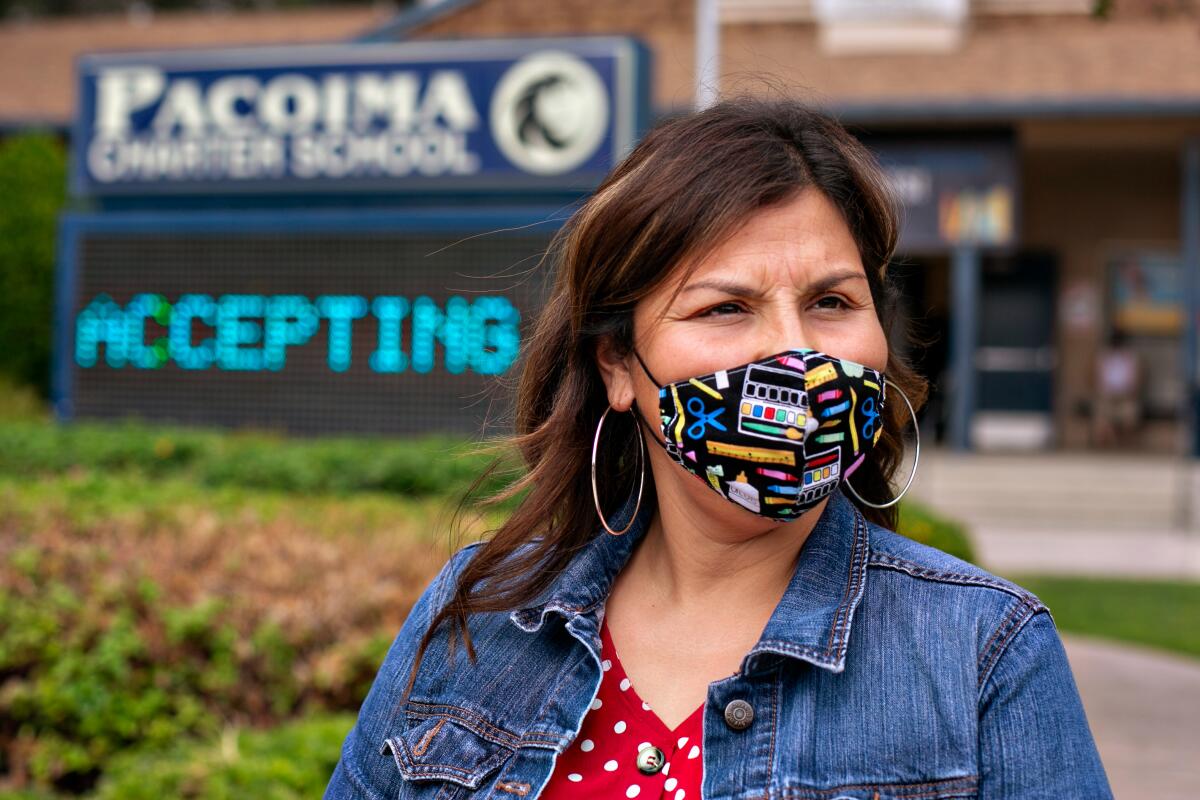
- Share via
Carlos Alarcón is too busy surviving the pandemic to focus on the recall election.
The 64-year-old mechanic from Sylmar lost two brothers to the coronavirus, as well as his job.
As his finances tanked, he had to move apartments several times.
“I have many things going on in my life,” the father of two said. “I haven’t been paying attention.”
Alarcón is far from alone.
Latinos were disproportionally devastated by the pandemic, with high death and infection rates caused in part by the fact that many are essential workers who got sick on the job.
Now, with a recall election less than two weeks away, many Latinos are too engrossed in daily struggles to pay much attention to the Republican-led effort to remove Gov. Gavin Newson that gained steam over pandemic-related issues.
They report feeling uninformed or disconnected. Some don’t know there’s an election or anything about the 46 candidates listed on the ballot to replace Newsom, a Democrat. Others are not eligible to vote.
Latino turnout and support will be crucial if Newsom is to stave off the recall. At 39% of the population, Latinos are the largest ethnic group in the heavily left-leaning state.
Because their registration rates are lower than other groups, they make up about a quarter of the electorate, with more than half identifying as Democrats.
Experts say that based on voting history, Latinos are more likely to support Newsom than not, despite criticisms from some that his pandemic precautions have stifled the economy, as well as the infamous French Laundry incident in which he violated his own protocols by dining with other families at an expensive restaurant in November.
Polls have shown that Latinos strongly supported Newsom’s stay-at-home orders and were deeply concerned about the toll of the pandemic.
The findings of the new poll by the UC Berkeley Institute of Governmental Studies and co-sponsored by the L.A. Times dispel the notion that California’s solid Democratic voter majority will provide an impenetrable shield for Newsom.
In July, 40% of likely Latino voters in a UC Berkeley Institute of Governmental Studies poll were against the recall. But other polls have suggested that Latinos may not be as reliably Democratic, including an Emerson College survey showing them in favor of the recall by 13 percentage points.
Candidates have courted Latino voters with campaign events and Spanish-language ads. Newsom has emphasized his handling of the pandemic, with Republican rivals Larry Elder and Kevin Faulconer criticizing those measures, as well as the state’s homelessness and crime issues.
The anti-recall side has launched a $1-million campaign targeting young Latinos by Voto Latino.
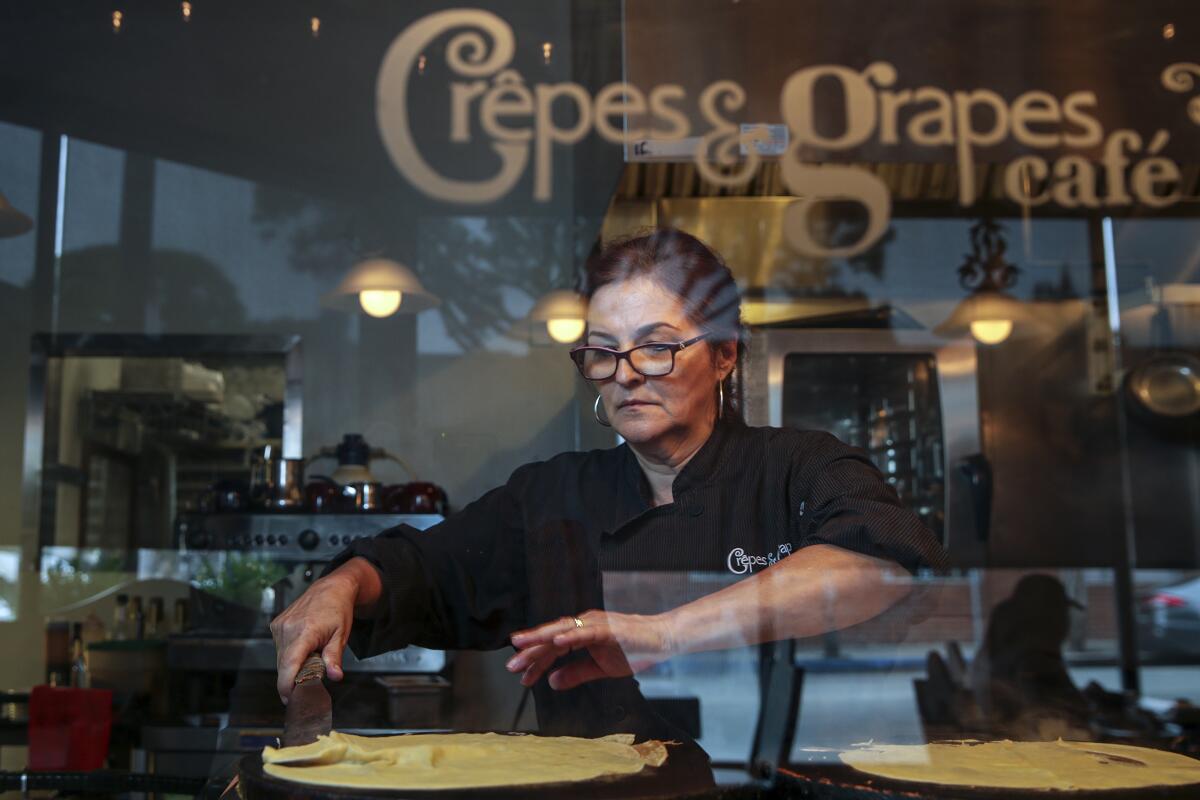
But how many Latinos will cast their ballots, as the Delta variant continues to wreak havoc on their lives, is an open question in an election where Democratic apathy could spell doom for Newsom.
“The issue is not whether Latinos are in favor of the recall,” said Sonja Diaz, director of the UCLA Latino Policy & Politics Initiative. “The real issue is, will nonwhite voters turn out to cast a ballot? If they do, then Gov. Newsom will remain in the governor’s mansion.”
In an off-cycle election in the middle of a pandemic, outreach to Latino voters that has a personal feel is key — yet has seemed to be largely absent.
“If you want voters to turn out, you have to invest in turnout,” Diaz said. “The failure of the political elite is to treat nonwhite voters as unsophisticated. They can be persuaded and they most definitely can be mobilized, but that requires resources.”
Elizabeth Gaitan of Watts didn’t plan to vote, because she felt disconnected from the election. She only ever tunes in for presidential races, she said.
The surge in recall campaign activity — exactly one month before election day — coincided with the arrival of the first ballots in voters’ mailboxes.
“I haven’t paid attention to what [the governor] has or hasn’t done,” said Gaitan, 31, a school cafeteria server on maternity leave. “Honestly, what he does probably affects me, but I just haven’t paid attention.”
But when she learned from a reporter that Elder planned to lift mask mandates if elected, she reconsidered.
She doesn’t support vaccine mandates but thinks masks help. Her father got COVID-19 last summer and has since recovered.
“Now that you tell me that, I’m more interested to know what’s going on,” she said. “I’ll probably pay more attention. I feel like if I’m informed enough or research enough, then maybe I will go vote.”
Still, less than two weeks before election day and with voting by mail already underway, many Latinos said they hadn’t received much information about the recall.
Sandra Hahn, the president of the Whittier Chamber of Commerce, said she hasn’t been contacted by either side and has “barely seen anything” outside of a few pro-recall tents.
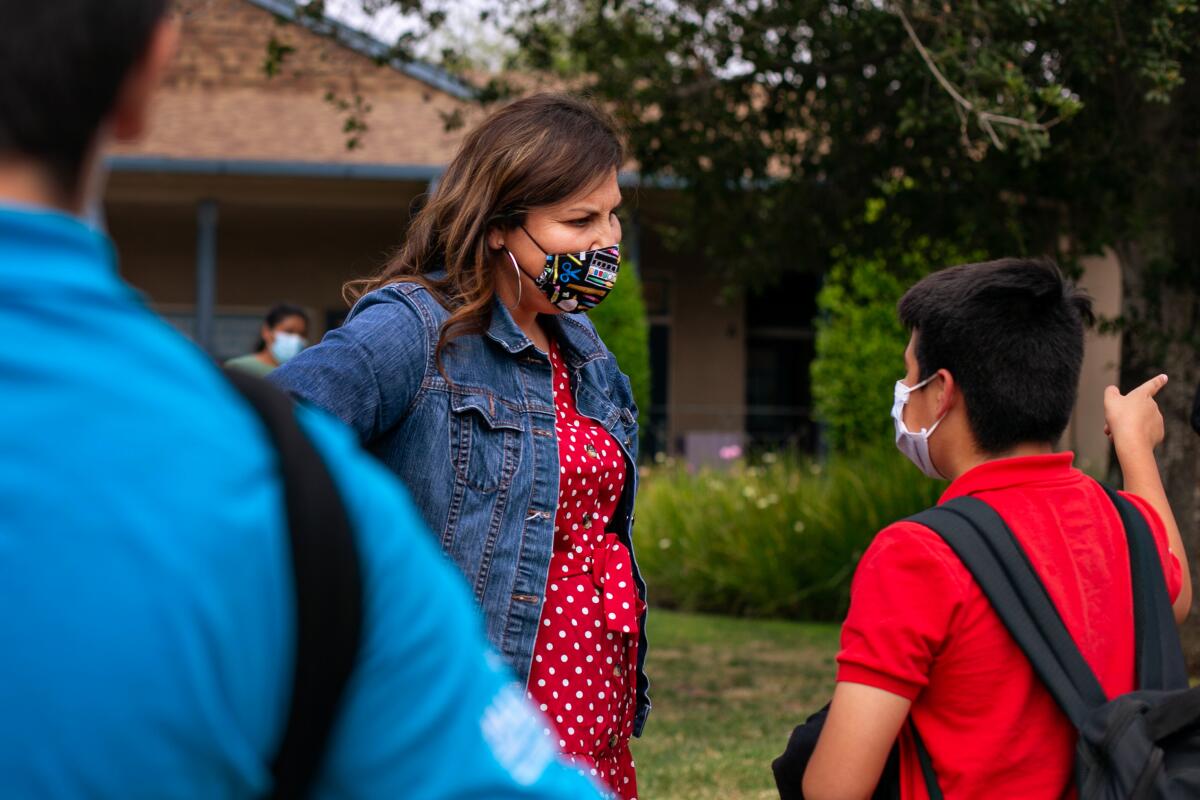
She has been educating struggling small business owners about federal pandemic loan programs while keeping her own restaurant afloat.
“I’ve been busy trying to help out as many businesses as possible and getting my business going,” said Hahn, who grew up in Whittier and East L.A and calls herself “a proud Chicana.” “I haven’t given too much thought to [the election.]”
Susie Betancourt, a teacher, said it’s been a quiet election season for her too.
She recently received five text messages in a row, from a nurses union and other groups, urging her to vote “no” on the recall.
Prior to that, she had seen only one recall-related flier, at her mother’s house. There was no chatter among students and parents at her school.
Betancourt, 41, said she is not a fan of Newsom but doesn’t feel he has performed poorly enough to warrant a recall. She intends to vote “no.”
Pacoima, where she teaches, has among the highest coronavirus death rates in the city of Los Angeles.
“Who would have done great over the last two years?” she asked. “This has been scary with the coronavirus, the closing of businesses and students staying home. I think he’s done fine.”
Many Latinos who spoke with The Times, including fruteros on Laurel Canyon Boulevard in Pacoima and street vendors in San Fernando, lacked proper documentation or were permanent residents without voting rights.
Hugo Sanchez is a U.S. citizen who drove vans for a local church until losing his job in May 2020, after indoor services were canceled.
“I’ve been hustling for jobs to pay the bills and rent and surviving,” he said.
Sanchez, 54, of San Fernando, is lukewarm on Newsom.
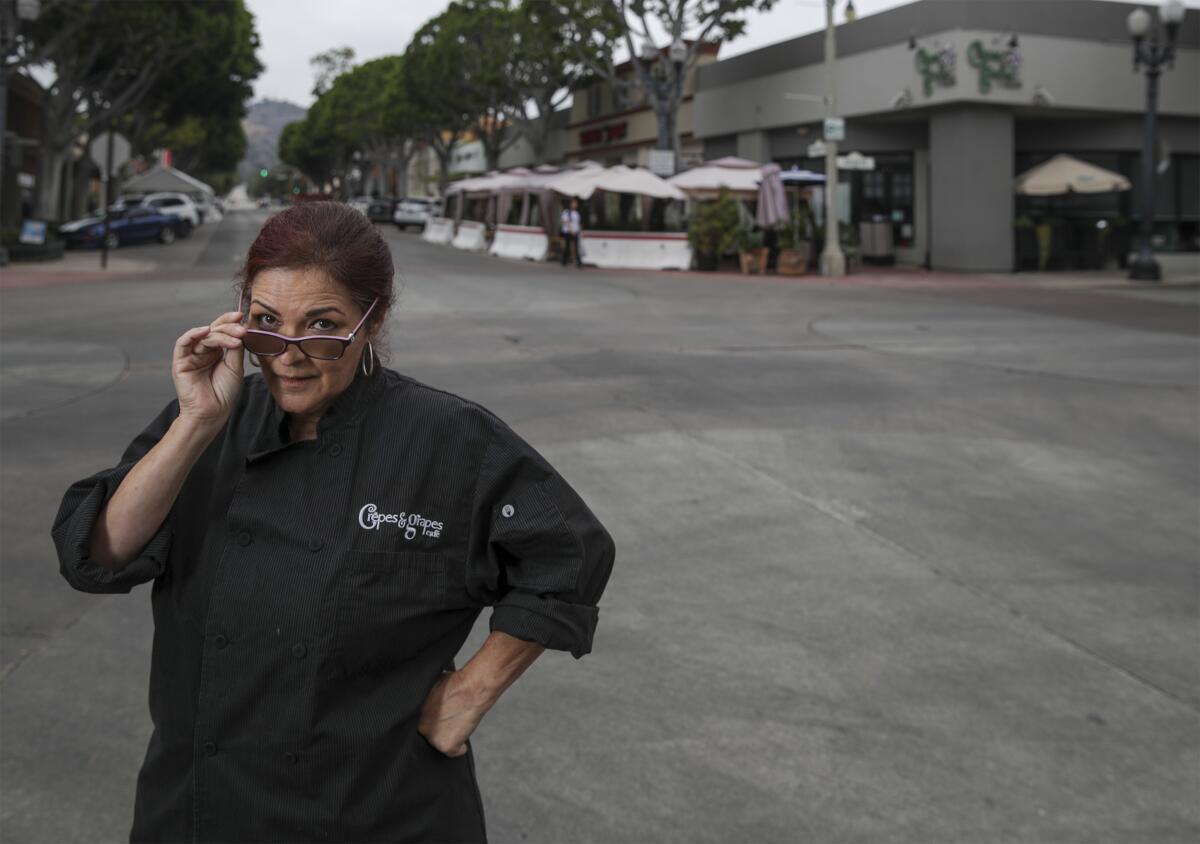
He has loathed wearing masks and says they inhibit his breathing while working.
On the other hand, the $600 stimulus checks from the state have helped him cover rough patches between gigs as a driver, handyman and mover.
“I would be sleeping on the streets without that money,” he said.
Sanchez became aware of the recall during a recent discussion on the Spanish-language morning radio program “El Show de Alex ‘El Genio’ Lucas.”
The hosts asked listeners to compare the rates of COVID-19 infection and deaths among California, Florida and Texas.
“We are doing better than those states,” said Sanchez, who contracted the coronavirus in late December and recovered within a week.
Sanchez said he would probably vote “no” on the recall — if he can find his mail-in ballot.
Fernando Guerra, a professor and founding director of Loyola Marymount’s Center for the Study of Los Angeles, said that because many Latinos are juggling day-to-day responsibilities, they don’t immediately study candidates or ballot measures — but some do eventually step up.
“They tend to focus later in the election,” Guerra said. “They tend to move more from the initial poll to what happens on election day. I’ve seen this happen over and over.”
Alarcón, the Sylmar mechanic who lost two brothers to COVID-19, credits Newsom with a successful vaccine rollout and a good pandemic strategy.
He only learned about the recall late last month, so he has some reading to do.
As of now, he is leaning toward a “no” vote.
More to Read
Sign up for Essential California
The most important California stories and recommendations in your inbox every morning.
You may occasionally receive promotional content from the Los Angeles Times.
